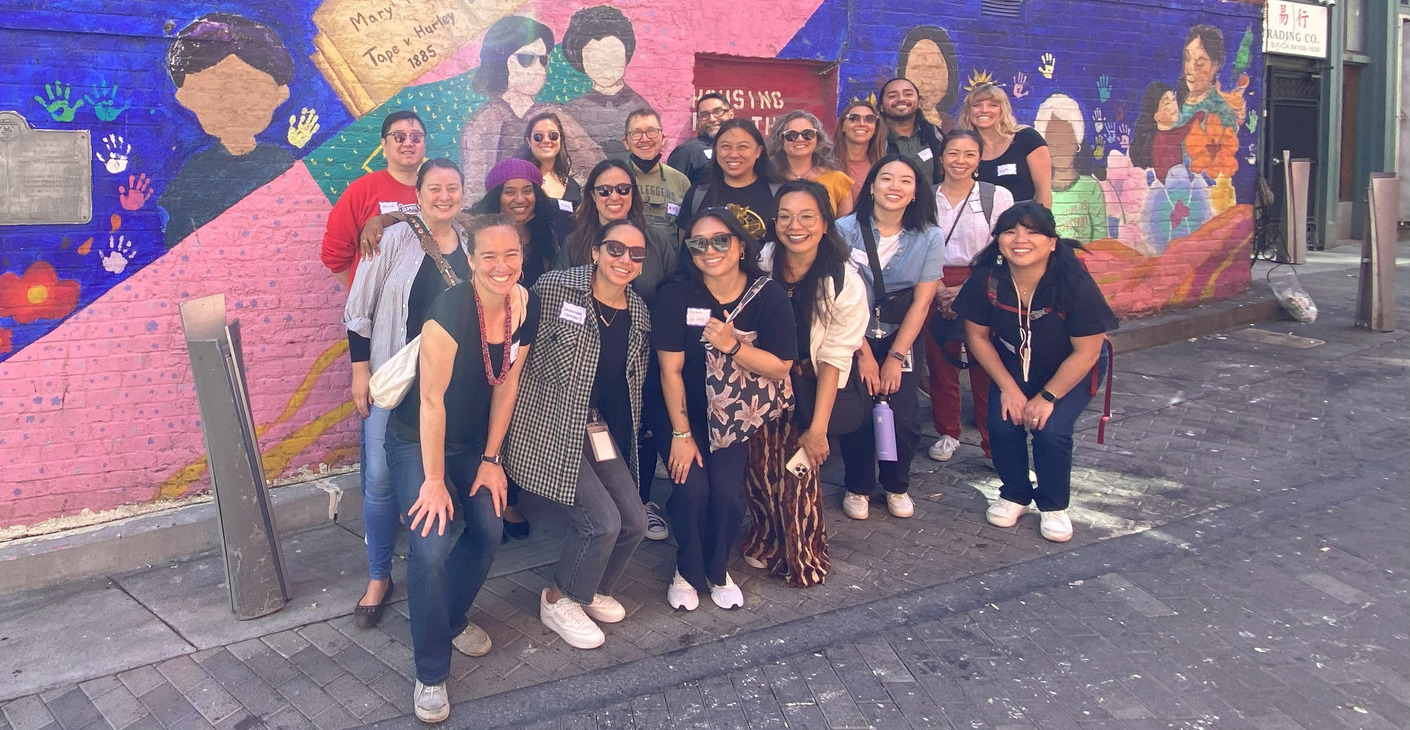In honor of AAPI Heritage Month in May, SFF’s AAPI Affinity Group hosted a walking tour of San Francisco Chinatown. The group was guided by Chinese Progressive Association (CPA), a grantee of the foundation and an organization with deep roots and history in Chinatown. Founded in 1972, CPA organizes working-class Chinese families in San Francisco to build power with other communities and demand better living and working conditions. SFF staff joined the tour to learn about the history of the neighborhood, the community’s advocacy for worker rights, and the youth-led organizing that continues today.
We started the morning at CPA’s office, where our guides grounded us in the purpose of the tour: to provide the opportunity for those not in the community to learn about the neighborhood. The tour was developed by CPA staff and informed by the history and experience of elders in the community. As visitors, it is a social responsibility to learn the history of Chinatown and to honor this space beyond a tourist destination. As a place-based community foundation, SFF participated in this tour to help staff better understand many levels of our work.
As we began walking through the neighborhood, we passed by Ping Yuen apartments, a public housing project now owned and operated by Chinatown Community Development Center (also an SFF grantee). Affordable housing remains a pivotal need and priority in the community, especially as many immigrant families live in single-room occupancy (SRO) housing.
SROs originally housed single male workers who emigrated to the U.S. to seek economic opportunity. Today, families with parents, children, and sometimes grandparents squeeze together in these single-room homes that often measure 6-by-10 square feet. Kids play and study in these tight spaces and multiple families share access to communal kitchens and bathrooms. During the pandemic, families also navigated illness and the challenge of being unable to quarantine. With support from CPA and other partners, SRO residents are leading outreach and advocacy to improve their living conditions and demand more affordable housing.
Next, we stopped at the new Chinatown – Rose Pak Station. Located on the corner of Stockton and Washington Streets, the construction of this Muni station was a core effort in transit justice for those living in Chinatown. Residents can now connect to several key points in San Francisco including civic, cultural, and business centers and additional transportation such as BART and Caltrain. While building the Rose Pak Station, construction workers discovered 19th century sewing machines – a holdover from the neighborhood’s once-thriving garment industry.
During that time, male garment workers in Chinatown formed labor guilds to protect themselves from discrimination and demand decent working conditions and higher wages. In the 1930s, female garment workers also unionized and organized strikes for better wages and conditions. Today, immigrant workers continue the legacy of worker power and organizing. In 2021, workers at Michelin star Z&Y restaurant organized and won $1.61 million in stolen wages and other labor violations. In a recent case, workers at Lee’s Deli restaurant won a $60,000 settlement.
As part of the tour, SFF staff were invited to read stories and quotes from workers themselves. “When I saw other coworkers come together, I had more confidence to ask for my unpaid wages. There’s more power when we take action together. We, the workers, should have dignity and decent lives,” said Lee’s Deli worker, Ruixian Liang.
We ended our tour at Portsmouth Square, a local park nicknamed “Chinatown’s living room.” This park is a central communal space for all members of the community. Here, elders exercise together in the mornings and children play on the playground. For decades, Portsmouth Square has served as a place of celebration and mourning, for activism and for organizing. Sparked by the summer 2020 racial reckoning, AAPI youth and community organized an Art Action Day to show solidarity with Black Lives Matter. CPA continues to align with this work and supports youth and student organizing, encouraging youth to develop their leadership and engage in cross-racial solidarity.
Visit cpasf.org for more information about their work, how to get involved, and donation opportunities. Check out SFF’s Mapping Change virtual tour to learn more about the history of racial equity in communities across the Bay Area.
Written by Jayana Alvarez and Casey Tran


